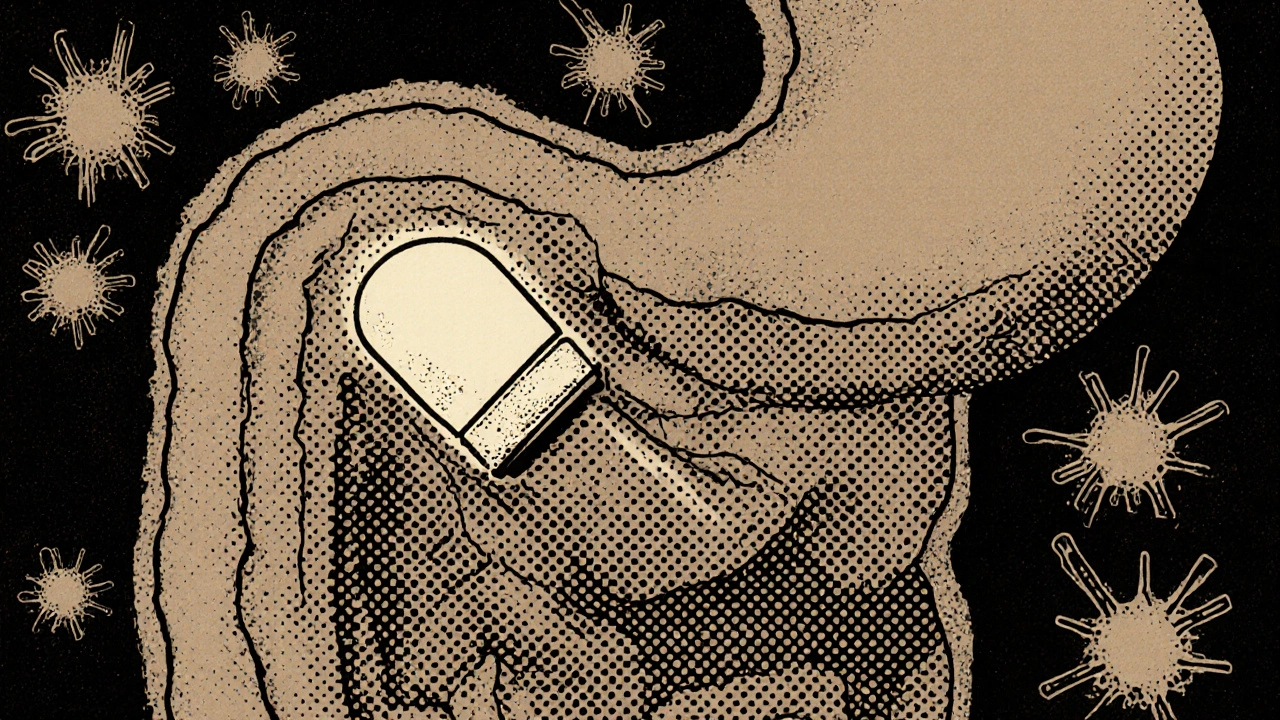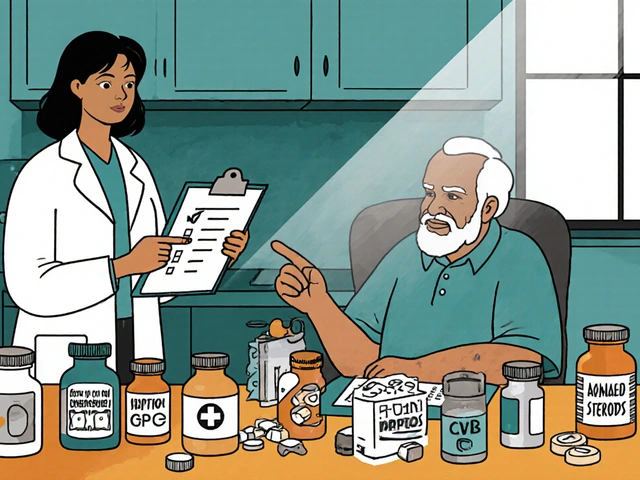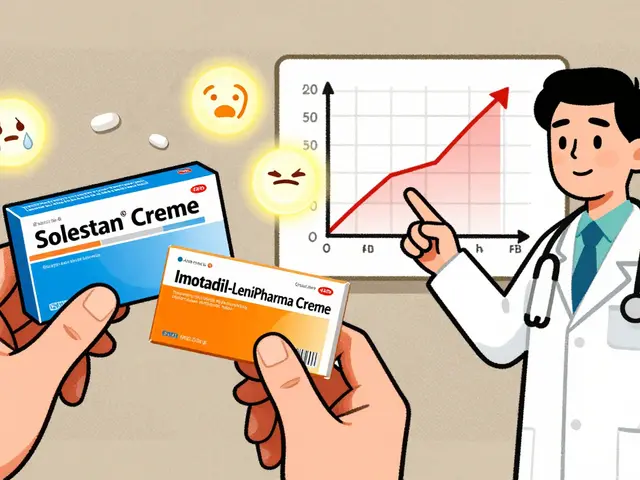
Probiotic Safety Calculator
Assess Your Probiotic Risk Level
This tool helps determine if probiotics are safe for you based on your medical condition, medications, and immune status. Results are based on current medical guidelines for immunosuppressed patients.
Your Risk Assessment
High Risk
ABSOLUTE CAUTIONProbiotics are strongly discouraged for patients in this category. Your immune system is severely compromised, and even beneficial bacteria can cause life-threatening infections.
- Avoid all probiotics, including fermented foods
- Consult an infectious disease specialist before considering any probiotic
- Monitor for fever, chills, or unusual symptoms
Important Safety Information
Even if your risk is moderate or low, always consult your doctor before taking probiotics. Some strains like Saccharomyces boulardii are particularly dangerous for immunosuppressed patients. Only consider single-strain products without this yeast.
Next Steps
If your risk assessment shows moderate or low risk, still speak with your healthcare provider. They can help determine if probiotics might be beneficial for your specific situation. Remember: even beneficial bacteria can become dangerous when your immune system is suppressed.
Never self-prescribe probiotics while on immunosuppressants. Always discuss with your medical team first.
Probiotics and Immunosuppressants: When a ‘Good’ Bacteria Can Turn Dangerous
Most people think of probiotics as harmless, even helpful-something you take to ease digestion, boost immunity, or recover after antibiotics. But if you’re on immunosuppressants-whether after a transplant, for autoimmune disease, or during chemotherapy-those same probiotics can become a silent threat. In 2023, the FDA issued a safety alert specifically warning immunocompromised patients about Saccharomyces boulardii, a yeast commonly found in probiotic supplements. Why? Because in people with weakened immune systems, even friendly microbes can escape the gut and cause life-threatening infections.
It’s not a myth. Between 2000 and 2020, 47 documented cases of probiotic-related bloodstream infections occurred in immunosuppressed patients, and nearly 36% of those cases ended in death. The culprits? Mostly Lactobacillus rhamnosus GG and Saccharomyces boulardii. These aren’t rare strains-they’re in over 70% of commercial probiotic products. And while healthy people rarely have issues, your immune system isn’t just ‘a little down’ when you’re on immunosuppressants. It’s turned off in key areas. That’s where the danger starts.
How Probiotics Work (And Why That’s a Problem for Immunosuppressed People)
Probiotics aren’t magic pills. They’re live bacteria or yeasts that work in three main ways: they crowd out bad bacteria, produce natural antimicrobials, and help strengthen the gut lining. For most people, that’s great. But if your immune system is suppressed-by drugs like tacrolimus, cyclosporine, mycophenolate, or even high-dose steroids-your body can’t fight back if those microbes slip through the gut wall.
This isn’t just theoretical. In patients with central venous catheters, Saccharomyces boulardii has been linked to a 27% higher risk of bloodstream infections. Why? Because the yeast can cling to the catheter surface and grow into a biofilm. Once it gets into the blood, it’s not just an upset stomach-it’s fungemia, a fungal infection in the bloodstream. Fatality rates for these cases hit 22% in some studies. Lactobacillus, usually harmless, can cause endocarditis (heart valve infection) or pancreatitis in people with suppressed immunity. The body doesn’t see these microbes as ‘good’ anymore. It just sees invaders it can’t kill.
Who’s at Highest Risk-and Who Might Still Be Safe
Not everyone on immunosuppressants is equally at risk. The danger varies by condition, drug, and timing.
- High-risk (absolute caution): Patients with neutrophil counts below 500 cells/µL, those who’ve had a stem cell transplant in the last 3 months, or anyone with a central line. These groups should avoid all probiotics. The risk isn’t worth it.
- Moderate-risk (consult your doctor): Solid organ transplant recipients in the first 3 months post-surgery, or those on multiple immunosuppressants for autoimmune diseases like lupus or Crohn’s. Probiotics aren’t automatically banned here-but they need infectious disease review first.
- Lower-risk (possible with caution): People with stable autoimmune conditions on a single drug (like methotrexate alone) and CD4 counts above 200 (HIV patients). Some studies show no increased risk here, but even then, only single-strain products should be considered.
- Low-risk: Healthy individuals without immune suppression. For them, probiotics are generally safe and may reduce antibiotic-associated diarrhea by over 50%.
Here’s the twist: liver transplant patients are an exception. A 2022 meta-analysis found they actually had a 34% lower rate of bacterial infections when using specific probiotics-with no rise in serious side effects. But bone marrow transplant patients? Their risk of probiotic-related bacteremia jumped 4.2 times. Why the difference? It’s not the drug-it’s the type of immune damage. Bone marrow transplants wipe out the body’s ability to make new immune cells. Liver transplants leave more of that system intact.

What Strains Are Safe? (Spoiler: Not All Are Created Equal)
Not all probiotics are the same. The strain matters more than the brand. Lactobacillus rhamnosus GG is one of the most studied-but also one of the most common causes of infection in immunosuppressed patients. Saccharomyces boulardii, while effective against diarrhea, is the most dangerous yeast for this group. A 2022 study showed multi-strain products had 63% more translocation risk than single-strain ones.
That means if your doctor says it’s okay to try a probiotic, ask for specifics:
- Exact strain name (e.g., Lactobacillus rhamnosus GG ATCC 53103, not just “Lactobacillus”)
- Only one strain, not a blend
- No Saccharomyces boulardii under any circumstances
And never assume “natural” means safe. Many probiotic supplements are sold as dietary supplements, not drugs. That means the FDA doesn’t require safety testing for people on immunosuppressants. You’re trusting a label that might not even list the exact strain. In 2023, only 12 out of 150 commonly used probiotic strains had enough safety data for immunocompromised populations.
What to Do If You’re on Immunosuppressants
If you’re taking drugs like prednisone, azathioprine, rituximab, or any transplant medication, here’s what you need to do:
- Stop taking probiotics unless your doctor says otherwise. Even if you’ve been taking them for years, your immune status can change. What was safe last year might not be today.
- Ask for a referral to an infectious disease specialist. They can assess your specific risk level based on your drug regimen, lab values, and medical history.
- If you’re cleared to use one, insist on a single-strain, non-Saccharomyces product. Document the exact strain and batch number.
- Watch for fever. If you develop a temperature over 38.3°C (101°F), stop the probiotic immediately and get blood cultures. Infection can develop within days.
- Don’t rely on Reddit or wellness blogs. Real cases show people with autoimmune conditions have had both miraculous results and life-threatening sepsis. Your situation is unique.
Some patients report better digestion, fewer flare-ups, or less bloating with probiotics. That’s real. But if your immune system can’t control the microbes you’re taking, those benefits aren’t worth the risk.

The Future: Postbiotics and Safer Alternatives
There’s hope on the horizon. Researchers are now testing “postbiotics”-inactivated bacterial cells or their metabolic byproducts. These offer the same immune-modulating benefits without the risk of live microbes entering the bloodstream. A phase 2 trial in immunocompromised patients showed a 40% drop in C. difficile infections with no adverse events.
Also, the PROTECT registry, launched in 2023, is tracking 5,000 patients across 47 hospitals to build the first evidence-based guidelines for probiotic use in immunosuppressed populations. Results are expected in mid-2025.
For now, though, the message is clear: if you’re on immunosuppressants, treat probiotics like a prescription-not a vitamin. They’re not harmless. They’re biological agents. And like any drug, they need careful management.
Frequently Asked Questions
Can I take probiotics if I’m on prednisone?
It depends. If you’re on a low dose (under 10 mg/day) and your immune system is stable, some doctors may allow a single-strain probiotic without Saccharomyces boulardii. But if you’re on higher doses or have other risk factors like a central line or recent infection, avoid them. Always check with your rheumatologist or transplant team.
Is Saccharomyces boulardii safe for transplant patients?
No. Saccharomyces boulardii is a yeast, not a bacterium, and it’s the most common cause of fatal probiotic-related infections in immunosuppressed patients. The FDA issued a safety alert in July 2023 specifically warning against its use in people with weakened immune systems. Avoid any supplement containing this strain.
What if I’ve been taking probiotics for years and feel fine?
Feeling fine doesn’t mean you’re safe. Probiotic infections often develop suddenly, with no warning. A 2020 case series showed three patients with autoimmune disease developed Lactobacillus bacteremia after years of daily probiotic use. Their immune systems changed-maybe due to a new drug, infection, or stress-and the microbes turned dangerous. Don’t wait for symptoms to stop.
Can I get probiotics from food instead of supplements?
Fermented foods like yogurt, kefir, sauerkraut, and kimchi contain live cultures, but in much smaller amounts than supplements. They’re generally considered lower risk because they’re not concentrated. Still, if you’re in a high-risk group (e.g., recent transplant, severe neutropenia), even these should be discussed with your doctor. Avoid unpasteurized products if your immune system is very weak.
Are there any probiotics approved for use with immunosuppressants?
No probiotic supplement is officially approved for use with immunosuppressants. VSL#3 is a prescription product covered by Medicare for pouchitis, but even that’s not labeled as safe for all immunosuppressed patients. The only approved use is for a very specific condition. Always assume any probiotic is unapproved for your situation unless your specialist says otherwise.
What should I do if I think a probiotic made me sick?
Stop taking it immediately. Go to the emergency room and tell them you’ve been taking a probiotic and now have a fever or chills. Request blood cultures and mention the strain name if you know it. Many doctors don’t realize probiotics can cause infections-your report could help save someone else’s life.
Next Steps for Patients and Caregivers
If you’re on immunosuppressants, the safest move right now is to pause all probiotic supplements. Talk to your doctor about your symptoms-digestive issues, bloating, or diarrhea-because there are non-microbial ways to manage them. Fiber, hydration, and prescription medications like rifaximin are safer options. If you’re desperate for relief, ask about postbiotics, which are starting to appear in clinical trials and may soon be available as medical foods.
Don’t let marketing convince you otherwise. Probiotic companies sell billions of dollars worth of products every year. But for people on immunosuppressants, the stakes aren’t about better digestion-they’re about survival. When your immune system is turned down, every microbe matters. Choose caution over convenience.




Dana Dolan
November 19, 2025 AT 23:28so i’ve been taking that one probiotic for my bloating since last year… kinda freaked out reading this. i didn’t even know saccharomyces boulardii was in it. gonna check the label tonight. thanks for the wake-up call.
Zac Gray
November 20, 2025 AT 02:00let me get this straight - you’re telling me that the same stuff people use to ‘boost their gut health’ can literally turn into a life-threatening bloodstream infection if you’re on immunosuppressants? and we’re still selling this like it’s a kombucha-flavored vitamin? the regulatory gap here is insane. if you can buy this at a gas station next to energy drinks, it shouldn’t be alive. it should be a pill. a dead pill. with a warning label bigger than the front of the bottle.
Steve and Charlie Maidment
November 21, 2025 AT 23:53you know what’s really funny? people on immunosuppressants are told to avoid crowds, wash hands constantly, and skip the flu shot - but then they’re encouraged to swallow live microbes like it’s a yoga retreat? the whole probiotic industry is built on fear of ‘bad bacteria’ while ignoring that the ‘good’ ones aren’t always good when your body’s asleep at the wheel. this isn’t science. it’s marketing with a lab coat.
Michael Petesch
November 23, 2025 AT 21:46This is a remarkably well-researched and clinically grounded piece. The distinction between transplant types - bone marrow versus liver - is particularly illuminating. It underscores the necessity of precision medicine in immunosuppression management. The data on translocation risk with multi-strain products is alarming, and the call for strain-specific documentation is not merely prudent - it is essential. One might argue that probiotics in this context should be classified as biological therapeutics, not dietary supplements.
Ellen Calnan
November 25, 2025 AT 11:10i’m crying a little. not because i’m scared - though i am - but because i’ve spent years trying to ‘fix’ my gut with powders and pills, thinking i was healing myself. and now i realize… i was just inviting invaders in. i’ve been on methotrexate for 7 years. my doctor never mentioned this. i feel betrayed. not by the article - by the system. who’s protecting us if not us? i’m deleting every probiotic app on my phone. i’m calling my rheumatologist tomorrow. this isn’t just info - it’s a lifeline.
Sam Reicks
November 27, 2025 AT 06:28the fda is in on it. probiotics are a scam to make you dependent on pills while they push vaccines. why would they warn you about live cultures unless they want you to take more drugs? you think they care if you get fungemia? nah. they want you hooked on immunosuppressants and probiotics and antibiotics and then you pay forever. this is all a money game. they dont want you healthy. they want you paying. read the fine print on your insurance. its all connected. stop trusting the system. trust your gut. literally. dont take anything. just eat meat and potatoes.
Kara Binning
November 27, 2025 AT 10:22so let me get this straight - some woman in a lab coat wrote a long article and now we’re all supposed to panic because a ‘yeast’ might get into our blood? i’ve been taking probiotics since 2018. i’m a 48-year-old woman with lupus. i’ve never had a fever. i’ve never been hospitalized. you think i’m gonna stop because some ‘study’ says 36% died? who were those people? were they smokers? did they have IV lines? did they ignore their doctors? or are we just scared of the word ‘yeast’ now? i’m not giving up my kefir. i’m not a lab rat.
river weiss
November 28, 2025 AT 20:37Thank you for this comprehensive and urgently needed summary. The distinction between strain-specific risk and brand marketing is critical. I am an infectious disease pharmacist and routinely counsel transplant patients on this exact issue. I cannot stress enough: avoid Saccharomyces boulardii at all costs. For those with stable conditions on monotherapy, a single-strain Lactobacillus acidophilus (ATCC 4356) may be considered - but only after documented neutrophil count >1000 and no central line. Always request batch numbers. And please, please - never self-prescribe. Your doctor is not your Amazon algorithm.
Brian Rono
November 30, 2025 AT 14:51Probiotics? Please. The entire industry is a cult. People think swallowing bacteria is the same as eating yogurt - like it’s some ancient wisdom passed down from grandmas who fermented cabbage. Newsflash: grandmas didn’t have 37-strain capsules with ‘immune support’ printed in glitter font. They ate fermented food because it preserved vegetables. Not because they were chasing ‘microbiome balance’ like it was a TikTok trend. This isn’t health - it’s spiritual capitalism dressed in lab reports. If your immune system needs help, get a real doctor, not a supplement bottle with a cute logo.
seamus moginie
December 1, 2025 AT 21:25ah now this is proper info. i was on tacrolimus after my kidney transplant and i took that probiotic because the nurse said it ‘helps with digestion’ - she didn’t even know what strain it was. i got sick last year - fever, chills, nothing showed up on scans. turns out it was lactobacillus in my blood. i was in icu for 11 days. now i dont touch anything that says ‘live cultures’. if your doctor says it’s fine, ask them to write it on a prescription pad. if they can’t - don’t take it. your gut isn’t worth your life.
Joe Durham
December 2, 2025 AT 09:11just wanted to say thank you. i’ve been reading this thread and i’m not sure what to do anymore. i’m on azathioprine for my Crohn’s. i’ve been taking a single-strain L. rhamnosus GG for 3 years - no issues. but now i’m scared. maybe i’ll pause it for a month and talk to my GI doc. i’m not trying to be a hero. i just want to live. this article didn’t scare me - it gave me a path forward. that’s rare.
Christopher Robinson
December 3, 2025 AT 01:32my mom’s a liver transplant patient and she’s been taking a probiotic for 5 years. i just sent her this article. she’s gonna call her team tomorrow. we’ve been avoiding this conversation because ‘she feels fine’ - but now we know fine doesn’t mean safe. thank you for writing this. i’ve been trying to tell people for years that ‘natural’ doesn’t mean ‘safe’ - especially when your immune system is on vacation. 🙏
James Ó Nuanáin
December 3, 2025 AT 02:41As a British transplant consultant, I must say this is one of the most accurate summaries I’ve encountered in recent years. The distinction between bone marrow and liver transplant risk profiles is not widely appreciated outside specialist circles. The mention of the PROTECT registry is particularly welcome - long overdue. I will be distributing this to my entire department. Also: Saccharomyces boulardii is a silent killer. Do not under any circumstances allow it near an immunocompromised patient. Even in yogurt form. Even if it’s ‘organic’. Even if your aunt swears by it. It is not worth the gamble. Period.